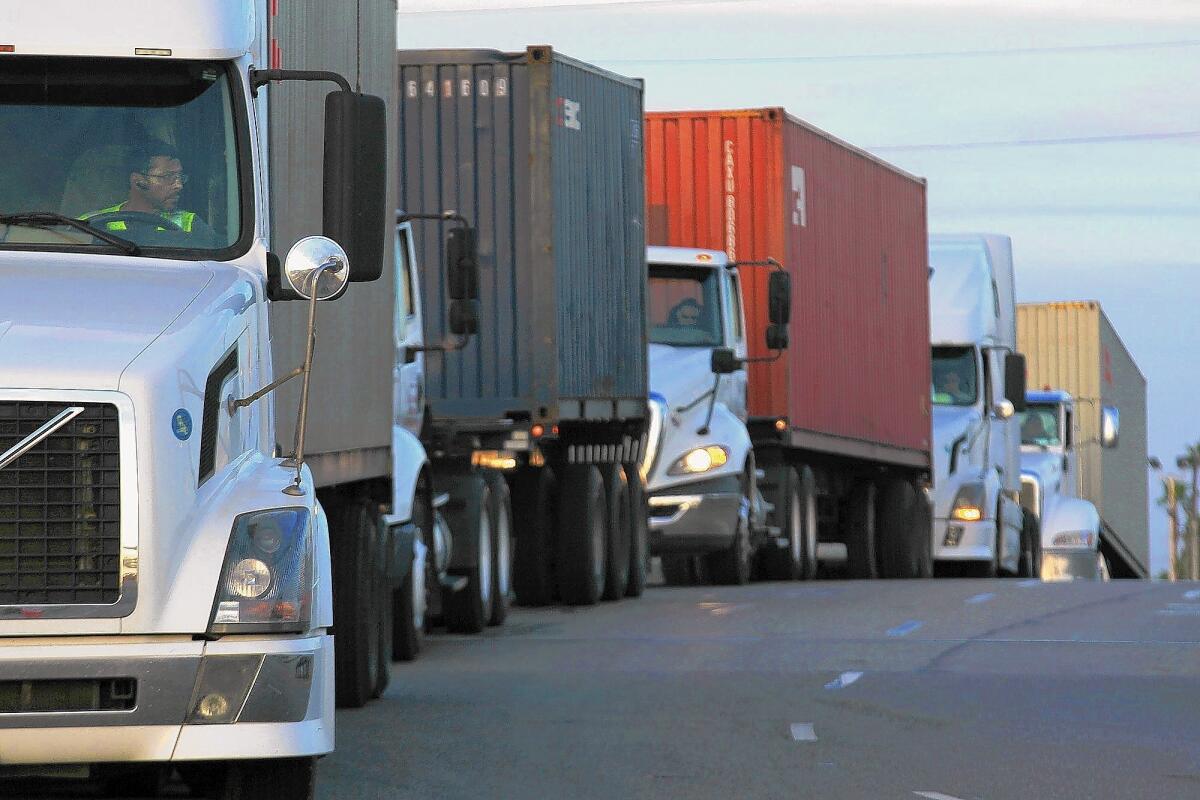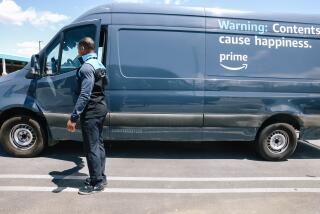Southern California port truck drivers loading up on wage-theft cases

After years of complaining about working conditions, truck drivers who move goods at Southern California’s sprawling ports appear to be making headway.
Drivers have filed lawsuits and have flooded the state with hundreds of claims alleging that they were improperly classified as independent contractors rather than employees by trucking companies. As contractors, the drivers don’t get the kind of overtime, workers’ compensation coverage and other guarantees that employees receive.
The state labor commissioner’s office is examining more than 300 claims for wage theft related to misclassification, a dramatic rise from 2011 when drivers filed only two such complaints. In all, more than 500 complaints were filed in 2012 and 2013.
In cases involving 17 trucking companies, the state Department of Industrial Relations has ruled in recent months that nearly 40 drivers were improperly designated as contractors, which denied them significant workplace protections. So far, $4.3 million in back pay and penalties has been awarded to drivers.
“The port drivers are racking up a number of victories” with the labor commissioner’s office, said Michael Waterstone, an employment law professor at Loyola Law School. “They’re going to keep trying to go there.”
The companies involved say the complaints have been trumped up as part of an effort to unionize drivers.
In one of those cases, state labor officials ruled in March that seven drivers were employees of Pacer Cartage Inc., which had classified them as independent contractors, and therefore were owed a total of more than $2 million in unpaid wages, expenses and attorney’s fees. The company has appealed and a civil trial is scheduled for this fall.
Industry experts estimate that only 10% of the region’s roughly 12,000 short-haul truckers are directly employed by companies. The remainder are owner-operators and are responsible for maintenance of the trucks they use to move goods in the massive logistics industry.
In a conventional contracting model, drivers are free to work for multiple companies, set their work schedule and hire other drivers. But drivers such as Javier Perez, one of the plaintiffs in the case against Pacer Cartage, said the reality is that employers exert tremendous control over drivers, particularly after implementation of a clean-truck program designed to reduce air pollution at the ports of Los Angeles and Long Beach.
Starting in 2010, trucks older than the 1993 model year weren’t allowed to conduct business at the ports, and Pacer offered to lease new trucks to drivers that would fulfill the environmental requirement of the program, according to the Department of Industrial Relations ruling.
“After the new trucks, the degree of control over us was more clear,” Perez said in Spanish. “The truck would need to stay at Pacer’s yard and we couldn’t have repairs done by other mechanics.”
Perez, who has worked as a port truck driver for 14 years, said that after the lease arrangements, Pacer illegally deducted from his paycheck costs for repairs to the truck.
That brought his pay to around $500 a week from between $1,000 and $1,500, making it a struggle to make ends meet, he said.
“I’m only looking to be paid what’s fair,” Perez said. “We’re not asking for more.”
The labor law skirmishes have also played out in court.
In June, a three-judge panel from the U.S. 9th Circuit Court of Appeals reversed a lower court’s ruling and found that drivers delivering Sears goods were misclassified as contractors by Affinity Logistics, a subsidiary of XPO Logistics Inc. Affinity is now known as 3PD Inc. and is based in Georgia.
Pacer Cartage also is a subsidiary of XPO Logistics, based in Greenwich, Conn. The decision against Pacer has been appealed to San Diego County Superior Court and a trial is scheduled for October.
If the Pacer drivers’ ruling by the labor commissioner’s office is upheld, “I think it’s going to change the way [trucking firms] do business,” Waterstone said. “Employers are going to pay attention when you have a lot of people that can make these claims.”
A spokesman for XPO Logistics said the company denies that Affinity or Pacer drivers were misclassified. It plans to appeal the Affinity ruling, petitioning for a hearing with the entire 9th Circuit Court.
“We believe the cases are without merit and continue to litigate them vigorously,” Troy Cooper, XPO’s chief operating officer, said in statement.
The outcomes of these cases will be closely watched by trucking firms, drivers and the Teamsters Local 848, which has mounted an aggressive campaign against Southern California’s leading short-haul trucking companies. Drivers and the union allege that misclassification of drivers is rampant among companies that serve the ports of L.A. and Long Beach and are a key link in the movement of products from cargo ships to retailers’ shelves.
According to one estimate by the National Employment Law Project, nearly two-thirds of the nation’s roughly 75,000 port truck drivers are misclassified as contractors.
Alex Cherin, a spokesman for the Harbor Trucking Assn., said union activists are wrongly accusing the entire industry of misclassification as part of an attempt to unionize drivers.
“We try to promote best practices within the industry,” Cherin said. “If there are companies that are willfully misclassifying drivers, we want them out of business just like everybody else.”
Cherin and port officials estimate there are 1,100 trucking companies that serve the ports. Most companies do business legally, he said, and the association provides general guidelines on legal issues.
Still, tension between truck drivers and companies over wage-theft complaints have escalated in recent years. Drivers have picketed at least four trucking firms and have accused one company of union-busting tactics.
Federal labor officials have also entered the fray.
In mid-June, the National Labor Relations Board accused Green Fleet Systems, a Rancho Dominguez firm, of more than 50 labor law violations, including firing drivers for union activity, retaliating against pro-labor employees and planting an anti-union operative amid its workforce.
Green Fleet has denied all the charges and a NLRB hearing is scheduled for this summer.
David Arambula, an attorney representing the drivers in the upcoming trial against Pacer, said he believes thousands of drivers who serve the ports are misclassified.
Arambula said his firm is responsible for filing about 200 claims with the Department of Industrial Relations. Those cases are slowly winding their way through the hearing process, though he plans a more aggressive approach and said he will move many of those complaints to civil court.
“There’s power in the group and the numbers,” he said. The drivers want to “use that to work out something that’s fair for everyone.”
More to Read
Inside the business of entertainment
The Wide Shot brings you news, analysis and insights on everything from streaming wars to production — and what it all means for the future.
You may occasionally receive promotional content from the Los Angeles Times.











